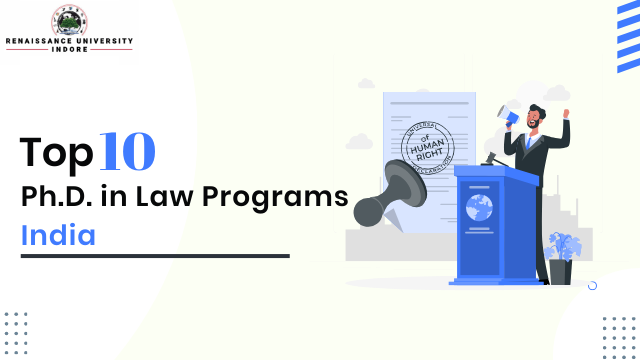Embarking on a journey to attain a Ph.D. in Law is a monumental decision for individuals seeking to deepen their legal expertise and contribute to the ever-evolving legal landscape. In India, where the demand for specialized legal professionals is on the rise, choosing the right program becomes crucial. This article explores the top 10 Ph.D in Law programs India, shedding light on the criteria for selection, the advantages of pursuing such a program, and the future trends in legal education.
The Need for Specialized Legal Education
As the legal landscape in India continues to evolve, the need for experts in niche legal areas becomes more apparent. General legal knowledge is no longer sufficient to address complex legal issues. Specialized education through Ph.D. programs equips individuals with the depth of knowledge required to navigate these challenges successfully.
Advantages of Pursuing a Ph.D. in Law
Let’s delve into the myriad advantages that come with pursuing a Doctor of Philosophy (Ph.D.) in Law, showcasing how this advanced degree can be a transformative and enriching experience for those passionate about the intricacies of legal systems.
-
Specialization and Expertise:
One of the primary advantages of pursuing a Ph.D. in Law is the opportunity to specialize in a particular area of interest. While a Juris Doctor (JD) degree provides a comprehensive understanding of the law, a Ph.D. allows for an in-depth exploration of a specific legal niche. Whether it’s international law, human rights, environmental law, or another specialization, a Ph.D. enables scholars to become true experts in their chosen field, contributing valuable insights to the legal community.
-
Contribution to Legal Scholarship:
Ph.D. candidates in Law are actively engaged in legal research, contributing to the ever-expanding body of legal scholarship. Through the production of a doctoral thesis, students are encouraged to identify gaps in existing knowledge, propose innovative solutions, and critically analyze legal issues. This contribution not only adds to the academic discourse but also has the potential to influence legal practice, policymaking, and societal understanding of legal matters.
-
Career Opportunities:
While a Ph.D. in Law is often associated with academia, the skills acquired during the program are highly transferable. Graduates may find rewarding career opportunities in various sectors, including government, international organizations, non-profits, and private firms. The analytical and research skills developed during a Ph.D. program are highly valued, making graduates well-equipped for roles such as legal consultants, policy analysts, or even leaders in legal education.
-
Networking and Collaborations:
Engaging with peers, mentors, and experts in the field is an integral part of the Ph.D. journey. This networking opportunity not only fosters collaboration but also opens doors to conferences, seminars, and workshops where candidates can present their research findings, receive constructive feedback, and stay abreast of the latest developments in the legal landscape. Such interactions can lead to collaborative research projects, enhancing the overall academic experience.
-
Intellectual Growth and Critical Thinking:
A Ph.D. program in Law is a rigorous intellectual challenge that demands critical thinking, creativity, and perseverance. The process of developing, conducting, and defending a doctoral thesis requires scholars to navigate complex legal concepts, think analytically, and communicate their ideas effectively. This intellectual growth extends beyond the academic sphere, shaping individuals into adept problem-solvers and leaders in their respective fields.
-
Contribution to Policy Development:
Ph.D. graduates in Law often play a pivotal role in shaping legal and public policies. Through their specialized knowledge, they can contribute to the development of laws that address contemporary challenges. This influence extends to both national and international levels, where Ph.D. holders may participate in think tanks, governmental advisory boards, or international organizations, influencing the creation of policies that impact societies on a global scale.
Top 10+ PhD in Law Programs in India
-
Renaissance University, Indore:
Emerging as a notable player in legal education, Renaissance University in Indore offers a promising PhD in Law program. With a focus on fostering research excellence and providing a supportive academic environment, the university is carving a niche for itself in the field of legal academia.
-
National Law School of India University (NLSIU), Bangalore:
Renowned as the pioneer of the National Law University system in India, NLSIU offers a stellar PhD in Law program. Its faculty, which includes esteemed legal scholars, and state-of-the-art research facilities make it a preferred choice for aspiring legal researchers.
-
National Law University (NLU), Delhi:
NLU Delhi’s PhD program is marked by its interdisciplinary approach and emphasis on cutting-edge research. The university’s strong linkages with the legal industry and international collaborations provide students with unique opportunities for academic and professional growth.
-
Jawaharlal Nehru University (JNU), New Delhi:
JNU’s School of Law and Governance hosts a vibrant community of legal scholars, making it an ideal environment for pursuing a PhD in Law. The university’s emphasis on critical thinking and diverse research methodologies sets it apart in the academic landscape.
-
NALSAR University of Law, Hyderabad:
With a commitment to fostering academic excellence, NALSAR’s PhD program attracts scholars with a penchant for interdisciplinary legal research. The university’s research centers and collaborations with international institutions enhance the research ecosystem.
-
National Law Institute University (NLIU), Bhopal:
NLIU’s PhD in Law program combines traditional legal research with contemporary perspectives. The university’s focus on nurturing a research-oriented mindset equips students to make meaningful contributions to legal scholarship.
-
Rajiv Gandhi National University of Law (RGNUL), Patiala:
RGNUL’s PhD program is characterized by its emphasis on empirical legal research. The university’s commitment to promoting research culture is evident through its research centers and frequent national and international conferences.
-
Symbiosis Law School, Pune:
Symbiosis Law School’s PhD program stands out for its focus on emerging areas of law. The school’s strong industry connections and emphasis on experiential learning create a conducive environment for innovative legal research.
-
The West Bengal National University of Juridical Sciences (NUJS), Kolkata:
NUJS’s PhD in Law program is distinguished by its faculty expertise in diverse legal domains. The university’s commitment to fostering a research-intensive environment is reflected in its numerous publications and research initiatives.
-
Gujarat National Law University (GNLU), Gandhinagar:
GNLU’s PhD program combines academic rigor with practical insights. The university’s research centers, workshops, and seminars contribute to a vibrant research community, making it an attractive choice for doctoral candidates.
-
University of Delhi, Faculty of Law:
The University of Delhi’s Faculty of Law boasts a rich history and a distinguished faculty. Its PhD program, rooted in a strong academic tradition, provides students with a solid foundation for contributing to legal scholarship.
Each of these programs offers unique features, and prospective Ph.D. candidates should thoroughly research the admission process, program duration, and curriculum to make an informed decision.
Top 10 PhD in Law Specialization India
Here are the top 10 PhD specializations in law in India, shedding light on the unique facets and opportunities each specialization presents.
-
Constitutional Law:
At the core of India’s legal framework, Constitutional Law remains a cornerstone for legal scholars. A PhD in Constitutional Law allows researchers to dissect and analyze the intricacies of the Indian Constitution, exploring its historical context, amendments, and contemporary relevance.
-
Criminal Law:
With the criminal justice system at the forefront, a PhD in Criminal Law provides scholars the chance to investigate the nuances of criminal statutes, procedures, and the broader ethical and moral dimensions of criminality in Indian society.
-
Environmental Law:
In an era of increasing environmental concerns, a PhD in Environmental Law is both timely and crucial. Researchers in this field engage in examining legal frameworks addressing environmental issues, sustainable development, and the intersection of law and ecology.
-
Intellectual Property Law:
In the digital age, protecting intellectual property has become paramount. A PhD in Intellectual Property Law equips scholars to navigate the complexities of patents, copyrights, trademarks, and emerging challenges in the rapidly evolving world of innovation.
-
International Law:
For those with a global perspective, a PhD in International Law opens doors to exploring the intricacies of treaties, diplomatic relations, and the role of international organizations. This specialization is ideal for scholars interested in the intersection of law and diplomacy.
-
Corporate Law:
In the realm of business and commerce, Corporate Law holds significant importance. A PhD in Corporate Law delves into issues such as corporate governance, mergers and acquisitions, and the legal aspects of business transactions, preparing scholars for a career in academia or corporate law practice.
-
Human Rights Law:
Advocating for justice and equality, a PhD in Human Rights Law allows researchers to focus on issues like civil liberties, social justice, and the protection of human rights on a national and international scale.
-
Family Law:
Navigating the complexities of familial relationships, a PhD in Family Law explores aspects such as marriage, divorce, child custody, and inheritance. Scholars in this field contribute to shaping legal frameworks that address the evolving dynamics of family structures in India.
-
Cyber Law:
As technology advances, so does the need for legal frameworks in the digital realm. A PhD in Cyber Law enables researchers to delve into the legal challenges posed by cyberspace, including issues related to data privacy, online security, and the regulation of emerging technologies.
-
Health Law:
In the wake of global health crises, the importance of health law has come to the forefront. A PhD in Health Law allows scholars to examine legal frameworks related to healthcare, medical ethics, and the intersection of law and public health.
Challenges and Opportunities in Pursuing a Ph.D. in Law
Challenges:
- Research Intensity: Undertaking a Ph.D. in Law demands an unparalleled level of research intensity. The need to contribute significantly to the existing body of legal knowledge requires an in-depth exploration of both primary and secondary sources. The sheer volume of information to sift through can be overwhelming, and the challenge lies in synthesizing this information into a coherent and original contribution.
- Isolation and Loneliness: The life of a Ph.D. candidate can be isolating. Hours of solitary research, reading, and writing can lead to a sense of loneliness. Unlike structured coursework, the Ph.D. journey often lacks the camaraderie of classmates, making it essential for candidates to actively seek out networking opportunities and build a support system.
- Navigating Complex Methodologies: Legal research often involves intricate methodologies, and Ph.D. candidates must grapple with choosing and mastering these methodologies. Whether employing qualitative or quantitative methods, the challenge is not only in understanding but also in applying these methodologies effectively to answer complex legal questions.
- Time Management: A Ph.D. is a time-intensive commitment that requires exceptional time management skills. Juggling teaching responsibilities, administrative tasks, and personal commitments alongside research can be overwhelming. Striking a balance is crucial to avoid burnout and ensure sustained progress.
Opportunities:
- Intellectual Independence: One of the unique opportunities presented by a Ph.D. in Law is the chance to develop intellectual independence. Candidates have the freedom to explore niche areas of interest, formulate their research questions, and contribute to the evolution of legal scholarship. This independence fosters creativity and originality in thought.
- Interdisciplinary Exploration: The interdisciplinary nature of legal research provides an exciting opportunity to engage with other academic disciplines. Ph.D. candidates in law often find themselves collaborating with scholars in fields such as sociology, political science, or economics, enriching their research with diverse perspectives.
- Publication and Networking: The Ph.D. journey offers numerous opportunities for publication and networking. Presenting research at conferences, submitting articles to journals, and engaging with the wider academic community can enhance a candidate’s visibility and open doors to collaborations and post-Ph.D. opportunities.
- Career Advancement: While pursuing a Ph.D. is a significant investment, it can also serve as a stepping stone to diverse career paths. Beyond academia, Ph.D. graduates in law are sought after in legal practice, policy-making, and research institutions. The qualification opens doors to leadership roles and positions of influence.
Tips for Success in a Ph.D in Law programs India
As you delve into the realm of legal academia, it’s essential to equip yourself with a toolkit of skills and approaches that will not only ensure successful completion of your Ph.D. but also contribute to your growth as a legal scholar. In this blog post, we’ll explore some invaluable tips for success in a Ph.D. in Law program.
-
Define Your Research Focus Clearly:
One of the first steps to success in a Ph.D. in Law program is to clearly define your research focus. Your dissertation will be the cornerstone of your academic contribution, so it’s crucial to identify a niche within the field of law that both excites you and aligns with the current discourse. A well-defined research question will guide your work throughout the program, providing a sense of direction and purpose.
-
Build Strong Relationships with Your Supervisors:
Establishing a positive and collaborative relationship with your supervisors is key to a successful Ph.D. journey. Regular communication, constructive feedback, and a mutual understanding of expectations will contribute to a smoother research process. Don’t hesitate to seek guidance when needed, and consider your supervisors as mentors who can offer valuable insights and support.
-
Develop Effective Time Management Skills:
Time management is a critical skill for any Ph.D. candidate. Balancing research, coursework, and other responsibilities requires careful planning. Create a realistic timetable for your research milestones, and be prepared to adapt it as needed. Prioritize tasks, set deadlines, and allocate specific time slots for focused research and writing.
-
Engage Actively in Academic Discourse:
Participate actively in academic conferences, workshops, and seminars within and outside your institution. Engaging with the broader academic community will not only expose you to diverse perspectives but also provide opportunities for networking and collaboration. Presenting your research at conferences can be a valuable experience, allowing you to receive feedback and refine your ideas.
-
Stay Informed About Legal Developments:
A successful legal scholar is one who stays abreast of current legal developments. Subscribe to legal journals, attend relevant events, and follow reputable legal blogs. A deep understanding of the current legal landscape will not only enhance the quality of your research but also position you as a knowledgeable and informed contributor to the field.
-
Cultivate Effective Writing Habits:
The ability to articulate your research findings effectively is paramount in a Ph.D. program. Cultivate strong writing habits early on, and seek feedback on your drafts from peers and supervisors. Take advantage of writing workshops and resources offered by your institution to refine your writing style and ensure that your dissertation is a polished and coherent piece of academic work.
-
Prioritize Self-Care:
Ph.D. programs can be mentally and emotionally demanding. It’s essential to prioritize self-care to maintain a healthy work-life balance. Establish regular breaks, engage in activities that bring you joy, and don’t hesitate to seek support when needed. A well-balanced lifestyle will contribute to your overall well-being and enhance your academic performance.
Future Trends in Legal Education in India
Legal education in India has long been revered for its rich history and rigorous academic traditions. However, as the legal landscape evolves globally, the need for innovation in legal education becomes increasingly apparent. In this era of rapid technological advancements and changing societal dynamics, it is imperative for legal education in India to adapt and embrace future trends to produce competent and forward-thinking legal professionals. This guide explores the key trends shaping the future of legal education in India.
-
Technology Integration:
The integration of technology is a transformative trend that is reshaping legal education globally. In India, institutions are incorporating technology-driven tools and platforms to enhance the learning experience. Virtual classrooms, online research databases, and interactive simulations are becoming integral components of legal education. This not only makes education more accessible but also equips students with the tech-savvy skills crucial for modern legal practice.
-
Interdisciplinary Approach:
The future of legal education in India is moving towards a more interdisciplinary approach. Law is increasingly interconnected with fields such as technology, business, and social sciences. Legal education programs are now incorporating modules that allow students to explore the intersectionality of law with other disciplines, fostering a holistic understanding of legal issues in a broader societal context.
-
Clinical Legal Education:
The shift towards experiential learning is gaining momentum in legal education. Clinical legal education, which involves practical training through simulated legal scenarios, internships, and real-world case studies, is becoming a cornerstone of legal curricula. This hands-on approach not only enhances students’ practical skills but also instills a sense of social responsibility and ethical practice.
-
Globalization and Comparative Law Studies:
As the legal landscape becomes increasingly globalized, legal professionals in India need to have a comprehensive understanding of international legal systems. Future trends in legal education are likely to emphasize globalization and encourage students to engage in comparative law studies. This exposure equips them to navigate cross-border legal challenges and understand the implications of global legal norms on local practices.
-
Focus on Soft Skills:
Beyond legal expertise, the legal professionals of the future need to possess strong soft skills. Communication, negotiation, critical thinking, and problem-solving skills are becoming paramount in legal practice. Legal education in India is recognizing the importance of nurturing these skills alongside doctrinal learning to produce well-rounded and adaptable professionals.
-
Ethics and Professionalism:
The legal profession is built on principles of ethics and professionalism. Future trends in legal education in India emphasize the cultivation of ethical values and a sense of professional responsibility. Courses dedicated to legal ethics, integrity, and professional conduct are gaining prominence to ensure that the next generation of legal professionals upholds the highest standards of integrity.
-
Adaptive Curriculum:
The dynamic nature of the legal landscape requires a curriculum that can adapt to evolving trends. Future legal education in India is expected to have a flexible and adaptive curriculum that can respond to emerging legal fields and specialties. This ensures that students are well-prepared for the evolving demands of the legal profession.
Conclusion
In conclusion, pursuing a Ph.D in Law programs India offers a unique opportunity for individuals to become experts in their chosen field and contribute significantly to the legal community. The top 11 programs highlighted in this article provide a diverse range of options, each with its own strengths. Prospective candidates should carefully consider their goals, research interests, and the specific offerings of each program before making a decision.
Frequently Asked Questions
- What is the typical duration of a Ph.D. in Law program in India?
- The duration varies but is typically around 3 to 5 years, depending on the program and individual progress.
- Can I pursue a Ph.D. in Law part-time while working?
- Some programs offer part-time options, allowing candidates to balance their studies with professional commitments.
- Are scholarships available for Ph.D. candidates in Law?
- Many universities offer scholarships and financial aid for Ph.D. candidates based on merit and research potential.
- What career opportunities are available after completing a Ph.D. in Law?
- Graduates can pursue careers in academia, legal practice, policy-making, and research institutions.
- How can I choose the right Ph.D. program for my research interests?
- Consider factors such as faculty expertise, research opportunities, and program curriculum to align with your research goals.














